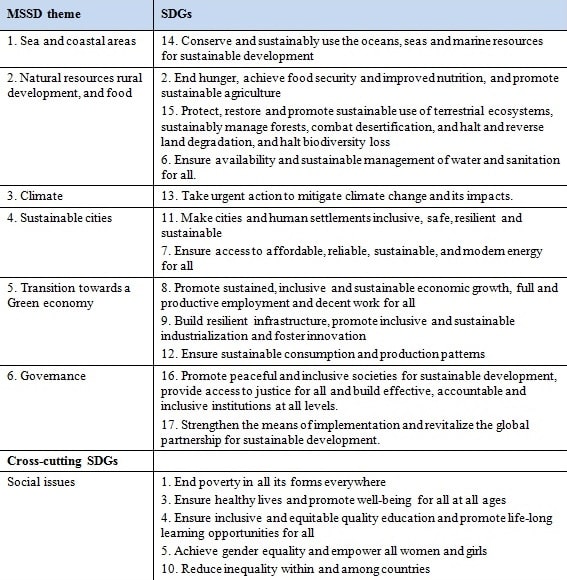Adopted in 2005 by the Contracting Parties to the Barcelona Convention[1], Mediterranean Strategy for Sustainable Development (MSSD[2]) provides a regional response to the global sustainable development agenda and the Millennium Development Goals. It provides an integrated policy framework for achieving the vision of a sustainable Mediterranean region and for the elaboration of national sustainable development strategies in riparian countries. The four objectives of MSSD sought to: contribute to economic development; reduce social disparities; change unsustainable production and consumption patterns; and improve governance. Accordingly, it established seven priority fields of action:
- Better management of water resources and demand;
- Improved rational use of energy, increased renewable energy use and mitigation of and adaptation to climate change;
- Sustainable mobility through appropriate transport management;
- Sustainable tourism as a leading economic sector;
- Sustainable agriculture and rural development;
- Sustainable urban development; and
- Sustainable management of the sea, coastal areas and marine resources.
The Contracting Parties during COP 18 in Istanbul, asked UNEP/MAP Secretariat to initiate the process to review the strategy for consideration and adoption next meeting of the Contracting Parties in 2015. The revision of the MSSD is led by the Mediterranean Commission on Sustainable Development (MCSD) with the assistance of the Secretariat to the Barcelona Convention. The technical work supporting the revision of the MSSD is being carried out by UNEP/MAP through its Plan Bleu Regional Activity Centre (PB/RAC), with the contribution of the other Regional Activity Centres. Key opportunities for the MSSD review are the link to the global process to develop Sustainable Development Goals (SDGs), thus ensuring that the Mediterranean region remains a frontrunner in the area of environmental and sustainability.
The review process of the MSSD was launched in February 2014, by Malta’s Minister for Sustainable Development, Environment and Climate Change. In April 2014, a wide stakeholder consultation started on the basis of a consultation document[3] aiming at eliciting stakeholder feedback on the set of issues to be addressed in the strategy, as well as the vision for the new strategy. Detailed responses were received from 60 organizations and individuals, which included the key stakeholders from the Mediterranean.
The consultation revealed that many of the critical issues affecting the Mediterranean region were captured well in MSSD, and should be retained in its revision, while new themes were highlighted.
On the basis of the consultation results, during its meeting in June 2014 in Malta, the Steering Committee of the Mediterranean Commission on Sustainable Development (MCSD) agreed on the following draft vision to guide the development of the new MSSD:
“A prosperous and peaceful Mediterranean region in which people enjoy a high quality of life and where sustainable development takes place within the carrying capacity of healthy ecosystems. This is achieved through common objectives, cooperation, solidarity, equity and participatory governance.”
Additionally, the MCSD Steering Committee recommended that the revised MSSD focus on the following thematic areas:
1. Seas and coasts; including efforts towards reaching Good Environment Status of Mediterranean marine and coastal ecosystems;
2. Natural resource; rural development and food; including links not only to marine and coastal, but also terrestrial habitats, and to fresh waters;
3. Climate; including the impacts of climate change on natural resources and socioeconomic sectors and possible responses;
4. Sustainable cities; including coastal urbanization and Integrated Coastal Zone Management, land transport, waste management, infrastructure, housing and energy;
5. Transition towards a green economy; including sustainable consumption and production, circular economy;
6. Governance; including financing, Aarhus Convention–related issues such as public participation, and cooperation.
These themes were compared with the list of SDGs as agreed by the Thirteenth session of the Open Working Group so as to ensure alignment as much as possible:

Based on these six themes, the MSSD review process kicked off in September 2014. For each theme a Thematic Working Group (TWG) was established. The UNEP/MAP Secretariat invited major stakeholders in the region, MAP Partner institutions, MCSD members and MAP Focal Points to participate and/or nominate experts to contribute to the work of the TWGs.
Through online consultations and face to face meetings, the TWGs developed the draft list of “Issues and Strategic Directions” for each one, along with the “Actions and Flagship Initiatives” to be undertaken, for the implementation of the new MSSD. “Costing and Proposed Sources of Funding” were also considered important parts of the proposed actions, in order to have a strategic document that is truly linked to implementation. The draft new MSSD is currently being edited and will be open for further consultation.
The MSSD Review Conference[4] will be held in Malta on 17-18 February 2015, with the kind hosting of the Government of Malta. The first draft of the new MSSD will be discussed and recommendations will be received. The meeting will be attended by MCSD members (Contracting Party representatives, NGOs, IGOs) and selected organizations and experts.
It is expected that a version of MSSD agreed by the Conference will be endorsed by the 16th Meeting of MCSD in Morocco in June 2015, before it is officially submitted for adoption by the 19th Meeting of the Contracting Parties to Barcelona Convention and its Protocols late 2015.
Sustainable development has been in the Mediterranean agenda since the first Rio conference. The region has experienced the very first reflections of the global sustainable development efforts since 1994 Tunis Conference on MED21 – the Mediterranean version of Agenda 21, which was followed by establishment of MCSD 1996 and the MSSD itself in 2005 following the 2002 Johannesburg Summit. Today, “Our Sea” is again pioneering regional responses to the global SDGs work. In this process, UNEP/MAP and its Components have the aim to make sure that this effort is an excellent example of a participatory strategy development and brings an added value but no added bureaucracy in translating the SDGs to the Mediterranean.
- http://www.unepmap.org
- http://195.97.36.231/dbases/acrobatfiles/05IG16_7_eng.pdf
- http://planbleu.org/sites/default/files/upload/files/MSSD_Review_Consultation_Document.pdf
- http://planbleu.org/en/sustainable-development-malta-conference
About the author

Atila Uras
Programme Officer, UNEP/MAP

